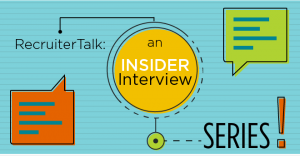After watching the results of the recent election, Laurie Ruettimann has come to the conclusion that the strong feelings our new president-elect has elicited might touch more than just politics; she believes his reach might affect the world of hiring and recruiting in 2017. It’s no wonder that Ruettimann is able to make this prediction – she has worn enough hats in the world of hiring and recruiting to see change coming.
A former human resources leader, Ruettimann has morphed into a speaker, writer, and entrepreneur. She also owns a consultancy business that offers a wide array of services to HR departments and technology companies and is the founder of GlitchPath, an early-stage startup focused on business insights and risk mitigation.
Ruettimann took time out recently to speak to MightyRecruiter about the necessary balance of technology and human touch in recruiting and offered her opinion about everything from the influence of millennials and the gig economy to how the election of Donald Trump may put more heart into recruiting practices in 2017.
Before we talk about 2017, can you look back on 2016 and discuss any lessons you’ve learned or any takeaways that you’ve found useful?
I heard a lot about ‘the war on talent’ in 2016, which I think represents HR departments that are underfunded, underutilized, or just not trained in the art of recruiting in the 21st century. I think that, in 2016, the best and most effective hires were made through smart recruiting processes, specifically through employee referral programs, by HR departments that had a budget for marketing designed to attract the best and brightest people. So that’s my recap of 2016.
In 2017, how do you see those smart recruiting processes evolving?
It’s about the right mix of technology and in-real-life, human-to-human experiences. It’s important to have regular, reliable, repeatable patterns and good data in your recruiting processes to be sure that candidates are all treated the same way. That said, you can’t use technology to do the work that humans do. It’s got to be the right blend of technology and human interaction. You can’t Skype your way to an effective hiring decision. You have to bring candidates in and spend some time with them.
What are some of the biggest headwinds that you see taking place in 2017?
We’re living in a post-truth world; we’ve been through an election cycle where feelings mattered more than facts. I think both sides of the aisle would say that. People are having really visceral feelings to the economic environment, whether or not it’s fact-based. If you think about how that translates to recruiting, a hiring manager may feel that a candidate is qualified even though they may not have the facts to back it up. I think that human resources and recruiting professionals are going to have a lot more conversations about feelings versus facts in 2017. That’s my prediction. I think those recruiters and HR professionals who do well in 2017 will be those who have a high EQ (emotional quotient) and who are able to make a case to the human heart.
How does this change how jobseekers will go about looking for work?
Candidates are becoming more concerned with a company’s behavior so it’s important for companies to tell stories about corporate social responsibility and fiscal conservatism so that candidates know they’re not going to work for the next Enron. We saw some bad company behavior with the dot com burst and then again in 2008 with the banking crisis. In 2017, I think jobseekers are going to be asking companies some tough questions about the future, so the more companies can tell a story about their investment in the community and in their workers, the better they are going to do in terms of attracting the right candidates.
In 2017, will millennial workers continue to drive some of the changes that we’re seeing in the workforce?
I think that what drives change are forces like technological advancements and the racially diverse make-up of this country. If you look at the professional workforce today versus 20 years ago, it’s been opened up in new ways to African-Americans, to Latinos, and to the LGBT community. In my opinion, those changes are more impactful than any change millennials can drive.
What about the on-demand workforce? It’s virtually doubled since 2008. Do you see that continuing, or is 2017 a year where we’ll see changes in this space?
The gig economy is the outcome of a couple of different things, specifically job automation and companies not wanting to take people on full-time and then have to lay them off later. Companies are really pushing the boundaries of what constitutes a full-time employee versus a contract worker, and I fear this is going to bite them in the butt in a couple of years. Jobseekers are taking the work that’s available, sure, but the data I’ve read suggests that if given the opportunity, these workers would like to go full-time.
Are there any technologies that you see playing a pivotal role or that offer unique value propositions in 2017 that haven’t taken hold yet in the marketplace?
I’m really fascinated by how much we are surveilling our workforce. We’re collecting all of this data on employee behaviors but I’m not sure anyone really knows what to do with it now. When someone comes along and starts connecting those dots, it’s going to be fantastic for employers and probably really scary for workers. This is what all of my nerdy HR friends are getting really excited about right now.
 MightyRecruiter
MightyRecruiter




Leave a Reply